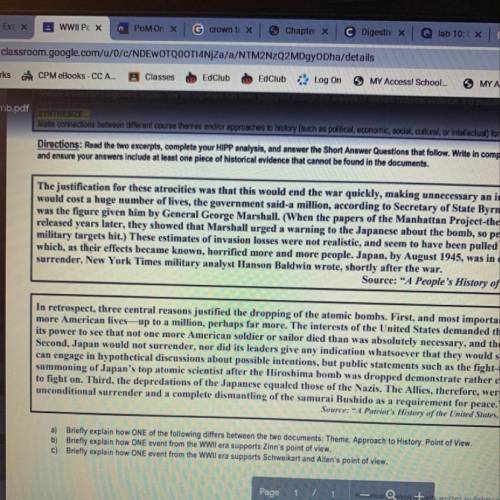
The justification for these atrocities was that this would end the war quickly, making unnecessary an invasion of Japan. Such an invasion
would cost a huge number of lives, the government said a million, according to Secretary of State Byrnes; half a million, Truman claimed
was the figure given him by General George Marshall. (When the papers of the Manhattan Project-the project to build the atom bomb-were
released years later, they showed that Marshall urged a warning to the Japanese about the bomb, so people could be removed and only
military targets hit.) These estimates of invasion losses were not realistic, and seem to have been pulled out of the air to justify bombings
which, as their effects became known, horrified more and more people. Japan, by August 1945, was in desperate shape and ready to
surrender. New York Times military analyst Hanson Baldwin wrote, shortly after the war.
Source: "A People's History of the United States, Howard Zinn, 1980
In retrospect, three central reasons justified the dropping of the atomic bombs. First, and most important, the invasion of Japan would cost
more American lives—up to a million, perhaps far more. The interests of the United States demanded that the government do everything in
its power to see that not one more American soldier or sailor died than was absolutely necessary, and the atomic bombs ensured that result.
Second, Japan would not surrender, nor did its leaders give any indication whatsoever that they would surrender short of annihilation. One
can engage in hypothetical discussions about possible intentions, but public statements such as the fight-to-the bitter-end comment and the
summoning of Japan's top atomic scientist after the Hiroshima bomb was dropped demonstrate rather conclusively that the empire planned
to fight on. Third, the depredations of the Japanese equaled those of the Nazis. The Allies, therefore, were justified in nothing less than
unconditional surrender and a complete dismantling of the samurai Bushido as a requirement for peace."
Source: "A Patriot's History of the United States, Larry Schweikart and Michael Allen, 2007
a) Briefly explain how ONE of the following differs between the two documents: Theme, Approach to History, Point of View.
b) Briefly explain how ONE event from the WWII era supports Zinn's point of view.
c) Briefly explain how ONE event from the WWII era supports Schweikart and Allen's point of view.


Answers: 1


Another question on History

History, 22.06.2019 07:10
One of the norms in the village was to meet at the town square on fridays for a community dinner and dance. the underlined word in the sentence above is best defined as a
Answers: 2

History, 22.06.2019 09:30
When lincoln was first elected president, he hoped to prevent war by allowing (1) in the united states. as time went on, he saw the (2) of the war as putting an end to slavery. once the civil war was over, president lincoln did not intend to (3) the south. he felt everyone had suffered enough. he wanted to the south, and the whole country, rebuild. the process of rebuilding the country following the civil war was called (4) the official surrender by general lee to general grant occurred at (5) and the terms were generous to the south. the terms of surrender said that the southern soldiers could go (6) and would not be prosecuted for (7) it also said that they must surrender their (8) but could keep their (9) officers were allowed to keep their (10) in order to make the achievements of the war permanent, three (11) were added to the u.s. constitution.
Answers: 2

History, 22.06.2019 13:00
Some people argue that television coverage of the vietnam war
Answers: 3

History, 22.06.2019 19:30
What region of the country was most involved in the civil rights movement?
Answers: 2
You know the right answer?
The justification for these atrocities was that this would end the war quickly, making unnecessary a...
Questions






History, 28.12.2019 21:31

Biology, 28.12.2019 21:31




Mathematics, 28.12.2019 21:31



Mathematics, 28.12.2019 21:31



Mathematics, 28.12.2019 21:31

Mathematics, 28.12.2019 21:31

History, 28.12.2019 21:31



